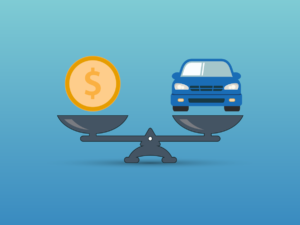Learn When To Refinance A Car Loan
Each auto refinance deal is different, so the timing of when you should refinance your car loan depends on when it makes the most sense for you. Still, most people refinance their car loans when 1) their credit has improved, 2) they need to lower their monthly payments, 3) national interest rates have changed, or 4) they would like to remove (or add) someone as a co-signor on their loan.
Let’s look at each scenario.
Your Credit Has Improved
If your credit has improved since you bought your car, then a lender will probably agree to refinance your current loan to one with a lower interest rate.
Usually, to save money over the course of your loan, all you need is to lower your interest rate by one percent or so (learn more about how car loan interest works here). However, if your credit has truly improved, you may be able to lower your interest rate by much more.
Keep in mind that your credit is more than your credit score. Lenders usually look at an applicant’s entire credit report(s) when considering a loan application. To learn more about how lenders may review your credit history, read the Four C’s of Credit.
You have a legal right under the Fair Credit Reporting Act to view your credit reports from each of the three nationwide credit bureaus every 12 months for free. Visit annualcreditreport.com or call 1-877-322-8228 to request your free report(s). Please note, annualcreditreport.com is the only website authorized to give you your legally mandated free report. Other websites exist that offer free credit reports or free credit scores, but some (not necessarily all) may try to get you to pay for your credit information. Visit this page from the Federal Trade Commission for more information on accessing your free credit reports.
You Need Lower Monthly Payments
One of most common reasons that people to refinance is to lower their monthly payments. Auto refinancing can be a great way to cut back on monthly expenses, but you need to be careful that refinancing, for this reason, makes sense for you.
Because of how car loan interest works, you have two ways to lower your monthly payments with a new loan. You can get a lower interest rate, you can extend your loan term, or you can do both.
So, if you refinance to a lower interest rate and keep the same loan term length, you would lower your monthly payments.
Or if you simply extend your loan term and keep your old interest rate, you will also lower your monthly payments. However, generally speaking, the longer your car loan term length, the more interest charge you will pay in total over the course of your loan.
The reason longer term lengths may cost you more over the life of your loan is that you pay an interest charge each month on the loan balance you have yet to pay. The longer you take to pay down your car loan, the more you pay interest on the loan balance you still owe. Still, it is possible to extend your loan term, lower your monthly payment, and pay less in total for your car. If you lower your interest rate sufficiently, a longer loan term length may not result in you paying more for your car.
Finding the balance between how much you pay per month versus how much you pay cumulatively over the course of a loan can be tricky. The important thing is that you understand how interest rates and loan term lengths affect how much your car loan costs so that you can make an informed decision about your refinancing goals.
Interest Rates Change
If interest rates fall across the economy, then you have a better chance of refinancing to a lower interest rate because lenders will generally lower their interest rates to compete.
However, it is not easy to accurately predict future interest rates. The Federal Reserve plays a role in setting interest rates but so do various economic forces, making interest rate prediction extremely difficult. The only sure thing is that interest rates will fluctuate. So, waiting for interest rates to fall may or may not be worth it.
Furthermore, just because falling interest rates can help borrowers does not mean that rising interest rates should discourage you from refinancing. If your credit has improved since you financed your car, refinancing may help you reduce your monthly payments and interest charges no matter what the prevailing interest rates are.
You Would Like to Remove (or Add) Someone as a Co-borrower
Not everyone seeks refinancing solely for financial reasons. Sometimes, more personal reasons motivate people to refinance, such as the ending of a relationship.
If you have a co-borrower on your current loan that you wish to remove for whatever reason, then refinancing may be a solution. When you refinance, you essentially replace your old loan with a new one, typically allowing you to remove a co-borrower from (and/or add someone to) your car loan.







